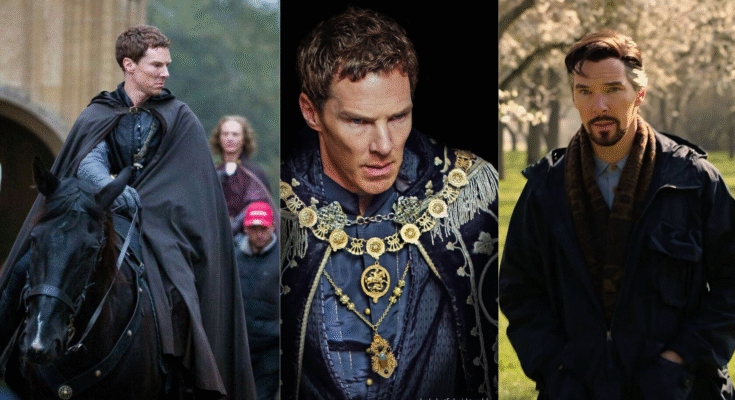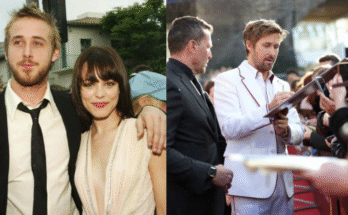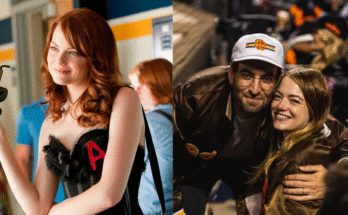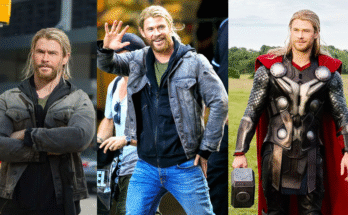A Relentless Pursuit of Authenticity in an Inauthentic Industry
Christian Charles Philip Bale stands as one of cinema’s most enigmatic and fearlessly committed actors. Born on January 30, 1974, in Pembrokeshire, Wales, to English parents Jennifer “Jenny” (James) and David Bale, his mother was a circus performer and his father, who was born in South Africa, was a commercial pilot. What began in 1983 as a cereal commercial for a child whose family was constantly moving between countries would evolve into one of the most impressive and transformative acting careers in contemporary cinema.
Unlike many actors who settle into comfortable roles and gradually fade from relevance, Bale has remained restlessly artistic, willing to sacrifice his physical health, his public image, and his comfort for the sake of psychological truthfulness in character. He is an actor who will destroy his body, isolate himself from colleagues, and endure genuine suffering—not for ego or vanity, but because he believes authenticity demands it.
In an industry built on beautiful surfaces and marketable personas, Christian Bale has done the opposite. He has made himself unrecognizable. He has gained weight intentionally, lost weight dangerously, transformed his posture, altered his voice, and disappeared into characters so completely that even other actors don’t recognize him on set. He has won an Academy Award for his work. He has been nominated for four more. Yet despite all this recognition, he remains one of Hollywood’s most private and mysterious figures.
The Wandering Child: An Unconventional Beginning
The family lived in different countries throughout Bale’s childhood, including England, Portugal, and the United States. Bale acknowledges the constant change was one of the influences on his career choice.
This geographic instability shaped young Christian profoundly. Rather than being damaged by constant displacement, he was trained in adaptability. He learned how to observe different cultures, different ways of speaking, different social rhythms. He learned that identity is not fixed—that you can be English in Wales, English in Portugal, English in America. Identity is something you construct. This realization—that self is performative, that who you are depends on context and choice—would become the philosophical foundation for his entire acting career.
His first acting job was a cereal commercial in 1983; amazingly, the next year, he debuted on the West End stage in “The Nerd”. A child actor making a commercial, then immediately performing in professional theater in London’s West End—this wasn’t a gentle entry into acting. This was total immersion. He was learning his craft not in acting classes, but on professional stages and film sets with experienced performers.
The Spielberg Discovery: Empire of the Sun
A role in the 1986 NBC mini-series Anastasia: The Mystery of Anna (1986) caught Steven Spielberg’s eye, leading to Bale’s well-documented role in Empire of the Sun (1987). For the range of emotions he displayed as the star of the war epic, he earned a special award by the National Board of Review for Best Performance by a Juvenile Actor.
Empire of the Sun was Bale’s breakthrough—directed by one of cinema’s greatest directors, performing opposite John Malkovich and other distinguished actors. The film required him to play a young British boy interned in China by the Japanese during World War II. The role demanded emotional maturity far beyond his years, physical demands that challenged a young body, and the ability to maintain psychological focus across a major film production.
He excelled. The performance was remarkable—nuanced, vulnerable, and complex. But the attention it brought him nearly destroyed his desire to act. For a teenager, being suddenly famous, being recognized on the street, having your schoolmates knowing your face—this can be overwhelming. Many child actors quit at this point. For a time, young Christian Bale considered doing exactly that.
But he didn’t quit. Instead, he made a choice that would define his entire career: he would keep acting, but he would protect his privacy obsessively, would refuse to become a personality or a celebrity, would treat acting as an art form rather than a pathway to fame.
The Wilderness Years: Finding His Identity as an Actor
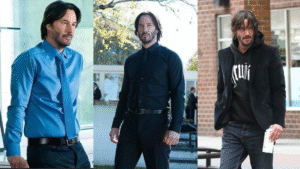
After Empire of the Sun’s critical success, Bale might have expected major roles to follow. Instead, he appeared in youth-oriented films like Newsies (1992), Swing Kids (1993), and Little Women (1994)—roles that kept him working as an actor without making him a household name. He provided voices for Disney animations. He appeared in made-for-television movies.
These weren’t prestigious projects. They weren’t career-advancing roles. But they were invaluable for his development as an actor. He was learning his craft away from the glare of major stardom, working with different directors, exploring different types of characters, developing discipline and professionalism.
He was also establishing his personality as an actor: someone who remained deliberately unknown, who gave interviews reluctantly, who refused to cultivate a public persona. While other young actors were appearing on magazine covers and talk shows, Bale was working quietly, studying his craft, preparing for the roles that would eventually establish him as a serious actor.
The Breakthrough: American Psycho and the Birth of Method Intensity
In 2000, Bale starred as serial killer Patrick Bateman in the psychological thriller American Psycho. His portrayal received positive reviews from critics and is often considered his breakthrough role.
American Psycho was the role that changed everything. As Patrick Bateman—a wealthy Manhattan investment banker who is also a serial killer—Bale delivered a performance that was simultaneously satirical and terrifying, darkly funny and profoundly disturbing. The character could have been a caricature in less skilled hands. Bale made him chillingly real.
What’s remarkable about his performance is how completely he inhabited Bateman’s hollow superficiality and underlying psychosis. To achieve this, while filming for “American Psycho,” he distanced himself from the cast and crew in order to maintain a dark side of his serial killer character Patrick Bateman.
This was the moment Bale established his signature approach to acting: total commitment to character, isolation from the outside world during filming, a willingness to damage relationships and sacrifice comfort in pursuit of authenticity. American Psycho showed that Bale was not a conventional actor seeking stardom. He was an artist willing to go to uncomfortable places for truth.
The Physical Transformations: The Machinist and Beyond
If American Psycho established Bale’s artistic commitment, The Machinist demonstrated his willingness to physically destroy himself for a role.
For the portrayal of Trevor Reznik in the psychological thriller The Machinist (2004), he lost 63 pounds (28.5 kg). But “lost weight” doesn’t capture the horror of what Bale did to his body. He didn’t go on a diet. He starved himself. He became skeletal, haunted, a living embodiment of psychological deterioration. He looked like a man who hadn’t slept in a year—which was precisely what his character was supposed to be.
The physical transformation was so extreme that it took a toll on his health. But the performance was extraordinary—the weight loss wasn’t vanity or a gimmick, it was essential to the character. An actor of normal weight could not have conveyed the psychological unraveling of a man so completely.
Immediately after The Machinist, Bale had to regain all that weight—and then some—to play Batman in Batman Begins. He dropped more than 60 pounds for The Machinist (2004) before beefing up for a superhero role in Batman Returns (2005) and its two sequels.
This pattern would repeat throughout his career. For American Hustle, he gained 43 pounds (20 kg), shaved part of his head and adopted a slouched posture, which reduced his height by 3 inches (7.6 cm) and caused him to suffer a herniated disc. He didn’t just gain weight; he changed his physical bearing so completely that he appeared to be a different person. Robert De Niro, who appeared in an uncredited role, did not recognize Bale when they were first introduced.
For Vice, he gained over 40 pounds (18 kg) and shaved his head to portray US Vice President Dick Cheney. The transformation wasn’t just physical—it was a complete inhabitation of a public figure’s mannerisms, voice, and psychological essence.
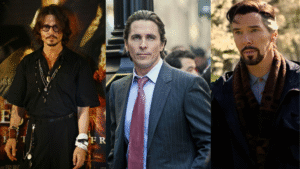
These physical transformations are not performances. They are commitments to authenticity so total that they damage the actor’s body. Some might call this excessive. Bale calls it necessary.
Batman: The Dark Knight Trilogy and Cinematic Mastery
Bale starred as Batman in Batman Begins (2005), a reboot of the Batman film series directed by Christopher Nolan. His portrayal of Batman was critically acclaimed and the movie became a box office success.
Batman Begins was a revelation. Rather than playing Batman as a simple superhero, Bale brought psychological complexity to Bruce Wayne—showing the trauma that created him, the discipline that forged him, the obsession that consumed him. Wayne wasn’t just a hero; he was a damaged man operating from a place of deep psychic pain.
He subsequently reprised his role as Batman in the second part of Nolan’s Batman film series, the sequel of 2005’s Batman Begins entitled The Dark Knight (2008). The Dark Knight elevated Bale’s performance through the introduction of Heath Ledger’s revolutionary Joker. Rather than being overshadowed, Bale responded by deepening his portrayal of Batman. He made Batman the emotional and philosophical center of the film—a man struggling against chaos and absolute evil.
The trilogy concluded with The Dark Knight Rises (2012). In 2012, Bale starred in the third, and final, installment of Nolan’s Batman film trilogy entitled The Dark Knight Rises as Batman. The final film gave Batman a conclusion worthy of the trilogy—allowing Bruce Wayne to find peace, to transcend the trauma that had driven him, to become something beyond vengeance.
The Dark Knight Trilogy remains one of cinema’s greatest superhero achievements, and Bale’s Batman is central to that success. He played a superhero as a damaged human being rather than an idealized hero.
The Oscar Victory: The Fighter and Reinvention
After the Dark Knight trilogy concluded, Bale faced a choice that many actors face: rest on the substantial laurels of one of cinema’s most successful franchises, or continue to challenge himself with difficult, less commercially certain roles.
He chose the latter.
For his portrayal of boxer Dicky Eklund in David O. Russell’s biographical film The Fighter (2010), he won the Academy Award for Best Supporting Actor.
Dicky Eklund is a supporting character—a drug-addicted former boxer who becomes trainer to his brother. In less skilled hands, the role could have been a cliché—the washed-up addict. But Bale transformed it into something tragic and darkly funny. He brought humanity to a character defined by failure and addiction.
To balance Eklund’s tragic condition, Bale incorporated humor in his characterisation. To play the role, he lost 30 pounds (14 kg). The performance was “shrewdly observed, physically precise and psychologically acute” according to San Francisco Chronicle’s Mick LaSalle.
The Oscar victory was significant—it proved that Bale could win awards outside of prestigious director-driven films, that he could deliver excellence in different types of roles, that his commitment to character transcended franchise filmmaking.
American Hustle: The Art of Con and Transformation
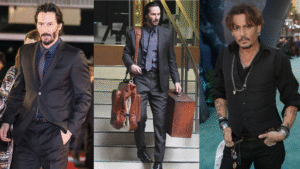
Following The Fighter, Bale reunited with director David O. Russell for American Hustle (2013). The film required him to play Irving Rosenfeld, a con artist—and the physical transformation was as extreme as anything in his career.
To play con artist Irving Rosenfeld, Bale studied footage of interviews with real-life con artist Mel Weinberg, who served as inspiration for the character. He gained 43 pounds (20 kg), shaved part of his head and adopted a slouched posture, which reduced his height by 3 inches (7.6 cm) and caused him to suffer a herniated disc.
The slouched posture wasn’t just a physical choice—it completely altered his appearance and his physical presence. He looked shorter, older, dingier. He became completely transformed into a small-time con artist. The performance was simultaneously sad, funny, and riveting. He was nominated for an Academy Award.
What’s remarkable about American Hustle is that it came right after The Fighter. Rather than repeating a winning formula, Bale took a completely different type of role. He demonstrated that his artistry wasn’t limited to one type of character or one register of performance.
The Big Short and Vice: Late-Career Brilliance
As Bale entered his forties, rather than fading into comfortable supporting roles, he continued to challenge himself with complex, transformative roles.
For his role as Michael Burry in the Adam McKay-directed biographical dramedy The Big Short, he was nominated for an Academy Award and BAFTA Award for Best Supporting Actor. As Burry—a brilliant, antisocial hedge fund manager with a glass eye—Bale delivered a performance that was technically precise and deeply human. He didn’t play Burry as a caricature; he played him as a socially awkward genius genuinely trying to connect with the world.
Then came Vice (2018).
For the 2018 biographical comedy drama Vice, Bale underwent a major body transformation, gaining over 40 pounds and shaving his head to portray US Vice President Dick Cheney. He described Cheney as “quiet and secretive”.
Vice required Bale to disappear completely into one of American history’s most powerful and least understood figures. The film received positive reviews, and The Guardian’s Peter Bradshaw commended Bale’s “terrifically and in fact rather scarily plausible” Cheney impersonation.
The performance was so convincing that during his Golden Globe acceptance speech, Bale thanked Satan for inspiring his Cheney portrayal, which elicited a response from Cheney’s daughter and US Representative Liz Cheney. The joke was vintage Bale—irreverent, slightly absurd, yet profoundly respectful to the work he’d done.
He won the Golden Globe Award for Best Actor – Motion Picture Musical or Comedy and garnered an Academy Award nomination.
The Artistic Philosophy: Total Commitment and Psychological Truth
What distinguishes Christian Bale from other excellent actors is his philosophical commitment to authenticity. He doesn’t believe in “acting” in the conventional sense—displaying emotions, pretending to feel. He believes in being. He believes that to play a character truthfully, you must actually become that character, at least while the cameras are rolling.
As he has said: “I don’t think I’m like any of the characters I’ve played – they’re all really far from who I am.” And: “Life is not stable. There is a great strength that comes from not being shocked or scared by upheavals.”
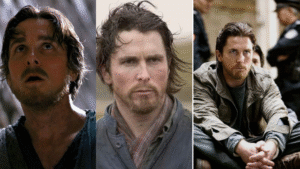
This philosophy explains everything about Bale’s career:
Why he isolated himself from colleagues while playing Patrick Bateman
Why he starved himself for The Machinist
Why he gained weight and changed his posture for American Hustle despite the physical damage
Why he learned to move like a boxer for The Fighter
Why he became Dick Cheney for Vice
He is not performing these characters. He is inhabiting them. He is allowing them to inhabit his body. He accepts the physical and psychological toll because he believes authenticity demands it.
The Batman Controversy and Personal Challenges
Despite his artistic achievements, Bale’s personal life has been marked by challenges. In 2008, he was accused of assaulting his mother and sister—accusations that were dropped due to lack of evidence. That same year, it was reported that he had a meltdown on the set of Terminator Salvation.
These incidents reveal a darker side of Bale’s intensity. The same commitment to psychological truth that allows him to deliver extraordinary performances can also create psychological strain. The isolation, the physical extremes, the emotional intensity—these take a toll. He is not a simple person. He is complex, sometimes troubled, occasionally volatile.
Yet what’s notable is how he has handled these challenges. Rather than hiding them or issuing defensive statements, he has acknowledged them and moved forward. He has not used them as excuses. He has continued working, continued challenging himself, continued pursuing his artistic vision.
The Prestige: Playing the Magician and the Artist
One of Bale’s most underrated performances came in Christopher Nolan’s The Prestige (2006), where he played an obsessive magician intent on revenge. The dual role—playing both the magician and the psychological obsession consuming him—required extraordinary precision.
The Prestige (2006) received positive reviews and was a commercial success at the box office. The film explored themes of obsession, identity, and the price of artistry—themes that might resonate with Bale’s own approach to acting. The magician in The Prestige is willing to destroy his own body and identity in pursuit of the perfect performance. This is, in many ways, Bale’s own philosophy applied to stage magic rather than acting.
Ford v Ferrari and Recent Work
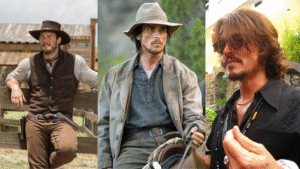
Bale has since played Ken Miles in the sports drama Ford v Ferrari (2019) and Gorr the God Butcher in the superhero film Thor: Love and Thunder (2022).
Ford v Ferrari marked a shift in Bale’s career. Rather than transforming his body, he played a character in a sports film with subtlety and authenticity. Ken Miles was a real person—a legendary race car driver—and Bale brought that historical authenticity to the role while also bringing psychological depth.
Thor: Love and Thunder allowed him to play a villain in a major superhero franchise, proving once again that his range extends across genres and character types.
The Award Record: Recognition Without Compromise
Over his career he has received various awards including an Academy Award, British Academy Film Award nominations, six Critics’ Choice Movie Awards, two Golden Globe Awards, and two Screen Actors Guild Awards.
What’s remarkable about Bale’s awards record is that every single award came for a role where he did something different, something challenging, something that required physical or psychological transformation. None of his awards came for comfort or for repeating a successful formula.
The Personal Life: Privacy and Principle
Bale has deliberately kept his personal life private. He lives with his wife, Sibi Blazic, and their two children. He gives few interviews. He rarely attends industry events. He donated time and resources to charitable causes including Greenpeace and the World Wildlife Foundation, but he doesn’t publicize these contributions.
He has made a choice fundamentally different from most actors: to live a private life while performing public characters. To keep his real self hidden while allowing his characters to be fully revealed. In an age of Instagram and relentless self-promotion, this is an act of rebellion.
The Curiosity That Got Away: Titanic and Paths Not Taken
Interestingly, Bale auditioned and almost played Jack Dawson in “Titanic,” but producers felt that with British actress Kate Winslet already signed, it would have been unfair to have two British actors portraying two Americans.
One wonders what Titanic would have been with Christian Bale as Jack Dawson. Certainly a different film. Bale would have brought psychological complexity and a darker edge to the character. But perhaps the film needed Leonardo DiCaprio’s boyish charm and emotional openness. The casting decision robbed us of one hypothetical, but it allowed DiCaprio to achieve the stardom that would define his career.
Conclusion: The Actor as Artist, Not Celebrity
Christian Bale represents something increasingly rare in contemporary cinema: an actor who views his work as art rather than celebrity, who is willing to sacrifice comfort and health for authenticity, who remains deliberately private and mysterious despite extraordinary fame.
He will never be as famous as Tom Hanks or Leonardo DiCaprio. He will never be beloved in the way audiences love certain movie stars. He is too dark, too intense, too unpredictable for that kind of universal adoration. But among actors, among directors, among those who understand the craft of acting, he is recognized as one of the finest actors of his generation.
His career is marked by transformation—not just of characters, but of himself. He has been willing to become unrecognizable, to damage his body, to isolate himself psychologically, all in service of truth. He has won an Oscar and been nominated for four more. He has worked with the greatest directors in contemporary cinema. He has delivered performances that will be studied and celebrated for decades.
Yet he remains, by choice, relatively unknown. He is the actor you might pass on the street without recognizing. The artist who refuses to be a celebrity. The man who would rather inhabit characters than become one.
In an industry built on beautiful surfaces and marketable personalities, Christian Bale has done the opposite. He has made himself invisible. And in doing so, he has become unforgettable.
“I don’t think I’m like any of the characters I’ve played – they’re all really far from who I am.” – Christian Bale
Perhaps this is the deepest truth about him: that the real Christian Bale remains unknown, hidden behind the extraordinary characters he has inhabited. And perhaps that is exactly as he prefers it.
